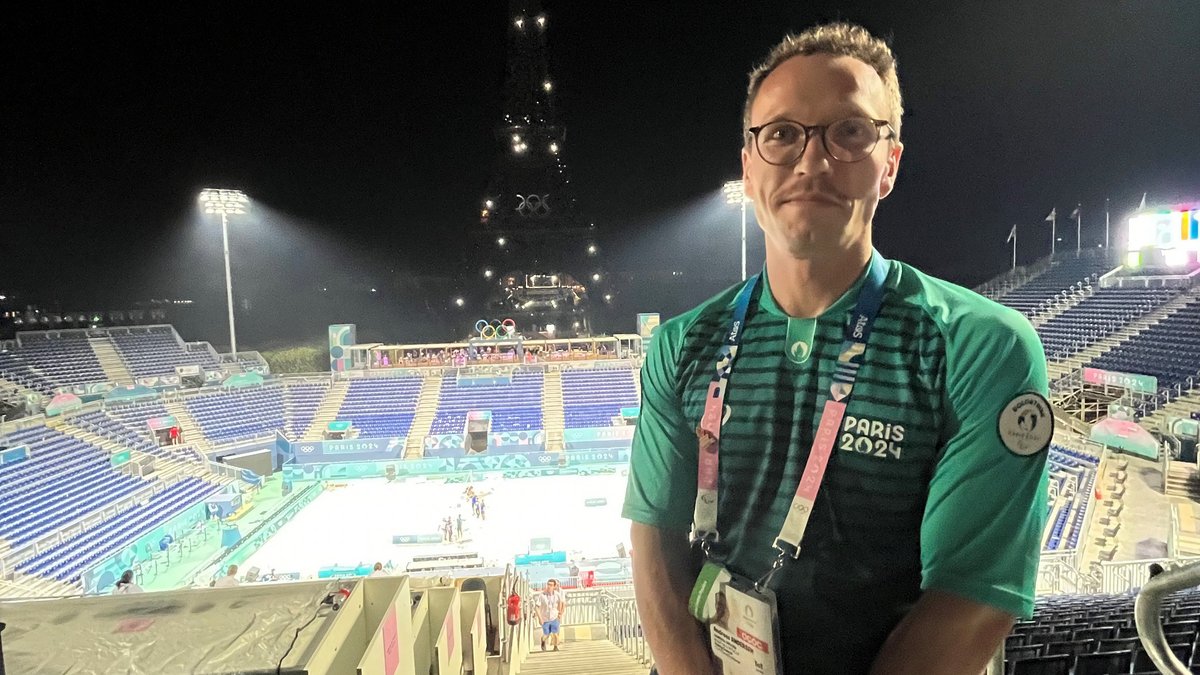From Aarhus to the Olympics: Andreas Breenfeldt Andersen tests the world's greatest athletes for doping
As an assistant professor, Andreas Breenfeldt Andersen researches topics such as doping and the grey areas of sports. But he also has a unique role that takes him to some of the biggest sporting events in the world.

Science in society
The University Act requires that researchers, alongside their research and teaching, engage in disseminating their work through so-called knowledge exchange or research-based communication.
“Science in society” is a series of articles about Health researchers who apply their expertise in society in ways that go beyond traditional research communication and expert commentary.
The air is filled with anticipation. 80,000 spectators from around the world find their seats at the stadium in Paris. The competition is about to commence, and medals are to be won. Behind the scenes, away from the spotlight, Andreas Breenfeldt Andersen moves with a different goal in mind: ensuring fair play.
This is a task he has dedicated himself to both as a researcher and a doping control officer.
“It’s an incredible experience to be part of the Olympic Games. But it’s also a task with a lot at stake. We help protect the integrity of sports, and we take that very seriously,” he says.
For the researcher, the role of a doping control officer is not just about catching cheats; it is also about creating a safe and secure environment in a process that can be both intimate and sensitive for the participating athletes.
Bringing research to the field
Andreas Breenfeldt Andersen explains that his work in doping control began almost by chance. During his bachelor’s project on a type of doping detection called the biological passport, he became immersed in the world of anti-doping. A job advertisement caught his interest, and before he knew it, he was part of Anti-Doping Denmark’s team of doping control officers.
“I applied on a bit of a whim because it matched my research, and I had a keen interest in sports. It quickly became clear that the role of a doping control officer could be both a practical extension of my academic career and a completely different way of engaging with sports in practice,” he explains.
For the past eight years, Andreas Breenfeldt Andersen has worked as a doping control officer alongside his research. His scientific background gives him an advantage, allowing him to better understand and explain testing methods and the biological processes behind doping.
“It’s two sides of the same coin. At the university, I research doping and the methods we can use to detect it. When I’m out in the field as a control officer, I see how theory is translated into practice. It gives me a unique perspective on both sides.”
Selection for the Olympic Games
But how does one actually get the opportunity to become a doping control officer at such a significant event as the Olympics?
“It’s quite a long process,” explains Andreas Breenfeldt Andersen.
“It started with an internal process at Anti-Doping Denmark, where you could apply as a candidate. Then I was screened and selected by the International Testing Agency (ITA), which coordinates the entire anti-doping effort at the Olympics. We had to go through several online courses and tests to ensure everyone was fully prepared for the procedures in place at the Olympics. There is no room for mistakes,” he says.
Even after passing the selection process, working as a doping control officer at the Olympics is far from glamorous. Travel and some accommodation are covered, but it is not a task undertaken for financial gain.
“You do it for the experience and to contribute to the sport. It’s a way to be part of something bigger,” says Andreas Breenfeldt Andersen.
During the Olympics in Paris, the doping control officers were housed in various locations around the city, far from the Olympic Village. This arrangement prevents relationships from forming between the officers and the athletes that could compromise their work.

A day in the life of a doping control officer
A doping control officer’s day at the Olympics is filled with variety. Some days involve hours of waiting, while others are hectic, with tests ranging from unknown athletes to global stars.
“The process begins with us receiving information about which athletes we need to test. Then we find them, often right after their competition. The test is conducted with great precision, and it’s important to be professional while also creating a secure environment for the athletes,” explains Andreas Breenfeldt Andersen.
The work as a doping control officer is about much more than just taking a sample.
“You need to create a comfortable atmosphere, even though it’s a bit of an awkward situation. It’s not fun to have to give a urine sample with someone watching. So, it’s about being both professional and empathetic,” he says.
Communication with athletes from all over the world can also be challenging.
The Olympics are a melting pot of cultures and languages, so creative solutions are often needed when English is not a common denominator.
“I’ve had situations where we had to use online translators, which can be quite a challenge when precision and clarity are crucial – like when giving instructions for a urine sample,” he explains.
Great experiences on the sidelines
Even though Andreas Breenfeldt Andersen was there to work, he also had time to enjoy the unique atmosphere that only the Olympics can offer. It was a journey filled with many memorable moments.
“To witness the world’s best athletes performing and breaking world records in front of 80,000 spectators in a packed stadium – it’s something special that you can’t help but get caught up in,” he says.
With the Olympics in Paris behind him, Andreas Breenfeldt Andersen is now looking forward to research projects back in Aarhus and more exciting assignments as a doping control officer.
“The technology in anti-doping is constantly evolving, and it will be exciting to see how we can use new methods from research to make sports even fairer and tests more effective in practice,” he says.
Contact
Assistant Professor Andreas Breenfeldt Andersen
Aarhus University, Department of Public Health
Phone: +45 29 93 71 79
Email: aban@ph.au.dk